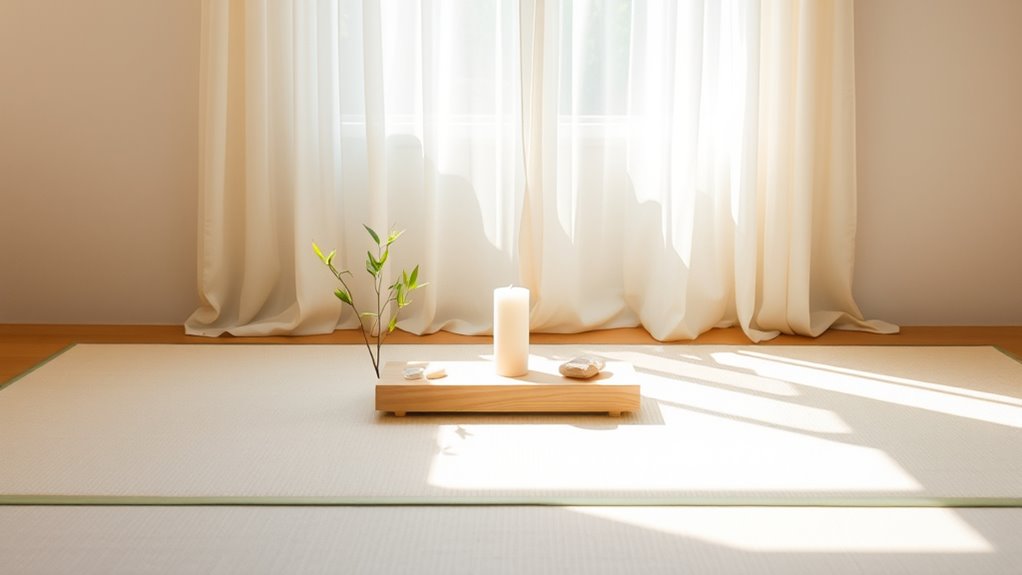Spiritual minimalism helps you clear mental and physical clutter, making space for what truly matters. By simplifying your surroundings and practicing regular meditation, you become more present and focused. Letting go of excess possessions and distractions reveals your inner self and fosters peace. Adopting small, mindful changes can deepen your sense of purpose and fulfillment. If you keep exploring, you’ll discover practical ways to deepen your journey toward clarity and serenity.
Key Takeaways
- Simplify physical and mental spaces to reduce distractions and foster inner peace.
- Incorporate regular meditation to enhance present-moment awareness and clarity.
- Practice mindful living by intentionally choosing activities that align with personal values.
- Declutter possessions and thoughts to reveal your true self and deepen fulfillment.
- Embrace small, consistent steps toward minimalism to sustain a peaceful and purposeful life.

Have you ever felt overwhelmed by the clutter of daily life and yearned for a deeper sense of peace? You’re not alone. In a world filled with constant noise, distractions, and obligations, finding clarity can seem impossible. That’s where spiritual minimalism comes in—an approach that encourages you to simplify your surroundings and focus on what truly matters. It’s about stripping away the excess so you can reconnect with your inner self and experience a more profound sense of peace.
One of the most effective ways to embrace spiritual minimalism is through meditation practices. Meditation helps quiet the mind and brings awareness to the present moment. Instead of getting caught up in endless worries or superficial pursuits, you learn to observe your thoughts without judgment. Regular meditation can sharpen your focus, reduce stress, and create space for clarity to emerge naturally. It isn’t about achieving a perfect state but about cultivating a gentle, consistent habit that nurtures your spiritual wellbeing. Over time, these practices become a foundation for mindful living—an intentional way of approaching each day with awareness and purpose.
Living mindfully means actively choosing to be present, rather than rushing through life on autopilot. It involves paying attention to your surroundings, your feelings, and your reactions without distraction. When you adopt mindful living, you start to notice how much unnecessary mental clutter you carry—worries about the future, regrets about the past, or the constant craving for more. By consciously simplifying your thoughts and surroundings, you create a mental space where clarity can flourish. This might mean decluttering your physical environment, but more importantly, it’s about decluttering your mind and heart. When you prioritize quality over quantity—whether in possessions, relationships, or commitments—you make room for genuine connection and inner peace.
Spiritual minimalism doesn’t require radical change overnight; it’s about small, consistent steps. Incorporate daily meditation practices, choose activities that align with your values, and let go of what no longer serves your wellbeing. As you do, you’ll notice a shift in your perspective—a greater appreciation for simplicity and a deeper sense of contentment. The more you practice, the easier it becomes to live mindfully and create a life rooted in clarity, purpose, and peace. Additionally, engaging in mindfulness practices can deepen your awareness and support your journey toward serenity. In this way, stripping away the unnecessary isn’t just about reducing clutter—it’s about revealing the true essence of who you are and what truly brings you fulfillment.
Frequently Asked Questions
How Do I Start Practicing Spiritual Minimalism?
To start practicing spiritual minimalism, begin by simplifying your life and focusing on what truly matters. Incorporate meditative practices into your daily rituals to cultivate mindfulness and clarity. Declutter your environment to create space for peace and reflection. Limit distractions and focus on meaningful connections. Over time, you’ll find that reducing excess helps you connect more deeply with your inner self, bringing greater serenity and purpose to your life.
Can Spiritual Minimalism Improve Mental Health?
Spiritual minimalism can profoundly boost your mental health, like turning chaos into calm. By embracing mindfulness practices and reducing mental clutter, you build emotional resilience, helping you handle stress more effectively. Simplifying your spiritual life encourages clarity, peace, and a stronger connection to yourself. As you focus on what truly matters, you’ll find your mind clearer, emotions steadier, and your overall mental well-being markedly improved.
What Are Common Challenges in Adopting Spiritual Minimalism?
You might find it challenging to adopt spiritual minimalism because it requires consistent practice, like mindfulness meditation and energy clearing, which can feel unfamiliar or demanding at first. You may also struggle with letting go of material possessions or old beliefs, making it hard to create space for clarity and peace. Staying patient and committed helps you gradually embrace simplicity, making these practices more natural and rewarding over time.
How Does Spiritual Minimalism Differ From Material Minimalism?
Imagine peeling back layers of unnecessary clutter, revealing a clearer path to your inner peace. Spiritual minimalism focuses on decluttering the mind and soul, letting go of material possessions that distract from true fulfillment. Unlike material minimalism, which emphasizes reducing physical belongings, spiritual minimalism seeks simplicity within—cultivating clarity and connection that transcend possessions. It’s about finding richness in less, nurturing your spirit rather than your stuff.
Is Spiritual Minimalism Suitable for Everyone?
Spiritual minimalism isn’t for everyone, but it can benefit you if you seek clarity and peace. It encourages you to cut down on material possessions and simplify daily routines, helping you focus on inner growth. If you’re open to exploring your spirituality beyond material things, this approach might suit you well. However, if your priorities are different, it’s okay to find a path that aligns better with your life.
Conclusion
By embracing spiritual minimalism, you clear the clutter that clouds your mind and heart, making space for true clarity and peace. It’s about stripping away the unnecessary to find what truly matters. Remember, sometimes you have to cut back to move forward. When you simplify your spiritual life, you open yourself to deeper connection and inner calm. Trust the process—less truly can be more, and in that simplicity, you’ll find everything you’re searching for.











